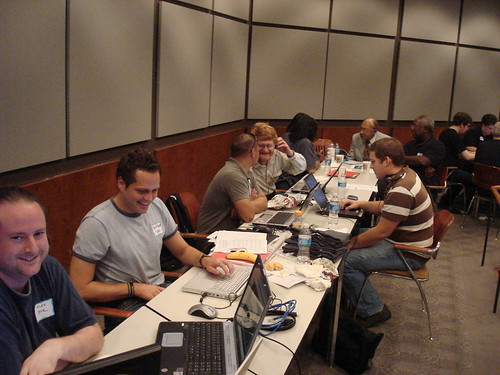 Imagine you work with youth. You help a group of youth to develop skills or explore careers or improve their grades or appreciate the arts or practice an art form – whatever. Maybe you are a choir teacher or a Girl Scout leader or a tutoring program coordinator. There’s a big, national conference on working with youth coming up, and you think, great, I am so going to that! I want to get lots of tips to help me be a better leader and supporter of youth!
Imagine you work with youth. You help a group of youth to develop skills or explore careers or improve their grades or appreciate the arts or practice an art form – whatever. Maybe you are a choir teacher or a Girl Scout leader or a tutoring program coordinator. There’s a big, national conference on working with youth coming up, and you think, great, I am so going to that! I want to get lots of tips to help me be a better leader and supporter of youth!
You arrive at the conference, and the opening speakers are all people who go on and on about how important it is to work with youth. Corporations that fund youth programs are lauded, youth are lauded, parents are lauded, politicians and celebrities that say Youth are great! are lauded – but no one ever mentions the people like you, that actually work with youth, that design and lead these programs and make them happen.
You didn’t come to the conference to be convinced to work with youth; you already work with youth. You know how great working with youth is. You have every intention of continuing to work with youth. You came to the conference to get the knowledge and tools you need to work more effectively with youth. And you were expecting for youth workers such as yourself to at least be mentioned on the first day of the conference.
That would be a really crazy scenario. But it’s how a lot of managers of volunteers feel about current national or international “volunteerism” conferences: these are focused on celebrating volunteerism, and that’s nice, but those that actually work with volunteers, that make that volunteer involvement happen, don’t get mentioned on the first day amid all the celebration of volunteers and the celebrities and politicians that love them.
Volunteers are not free. Volunteers also do not magically appear to build houses or clean up a park or tutor young people. In fact, successful volunteer engagement is absolutely impossible without someone coordinating all of the people and activities, training people, screening people, etc. – that person could be a volunteer himself or herself, it could be a paid person, it could be an employee on loan from a corporation, but make no mistake, that person, that volunteer manager, is real and absolutely essential – and deserves to be named at some point during the opening activities that kick off, say, the National Conference on Volunteering and Service?
After attending five of the national conferences on volunteering in the USA, I stopped attending (I think my last one was in 2004). By my last conference, I was tired of managers of volunteers being ignored amid all the celebrations of celebrities and politicians who think volunteers are so swell and magical, and tired of seeing and presenting the same workshops over and over. I was tired of my ideas for advanced volunteer management topics being rejected – organizers wanted only very basic workshops introducing the concept of virtual volunteering (a practice that by the year 2001 was already more than 30 years old!), if at all, and certainly nothing more advanced than that. I gave up.
It took the 2006 NetSquared conferences to remind me of what a conference for those that work with volunteers could be. Here’s why I loved that conference – it would be so great if those that organize the NCVS conference (which will be in Washington, D.C. yet again!) would read it, think about it, and rise to the challenge of presenting such a conference!
If they did, I would so be there….
Note: this blog is in response to a series of tweets by people associated with the NCVS who were miffed (maybe even outraged?) that the conference’s lack of recognition for those that manage volunteer programs was being talked about online. It’s a shame that, instead of listening and considering, they got defensive, even accusatory (apparently, because I wasn’t there, I’m not supposed to talk about it). It’s not too late to turn this into a win, to consider the criticism and really think about ways to take the conference to the next level – and to ensure volunteer managers are acknowledged. I’d be the first to publicly laud organizers if that happened.


